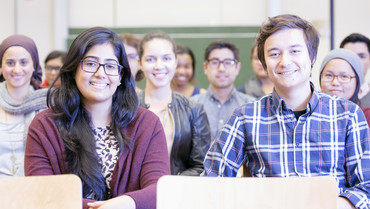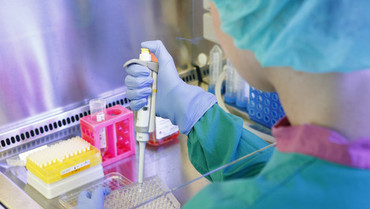Modules
The Master's program in Cardiovascular Science comprises a total of 120 ECTS credits within 24 months.
- 77 ECTS credits must be earned within the program itself from the theoretical modules (M.CVS.101, 102, 201, 301, 004 & 005) as well as the practical modules (M.CVS.001, 002 & 003).
All modules of the program are mandatory! - 30 ECTS credits for the master thesis and
- 13 ECTS credits from freely selectable elective modules (language courses, business studies, academic writing, ...)
M.Sc. Cardiovascular Science: Theoretical Modules

The Master Program Cardiovascular Science contains four theoretical modules (M.CVS.101, M.CVS.102, M.CVS.201, M.CVS.301) with a consecutive curriculum covering basic knowledge on the organ and molecular level of the cardiovascular system, on cardiovascular diseases and therapies as well as on modern aspects of cardiovascular science incl. "state-of-the-art" work.
In addition, this curriculum is accompanied by the modules M.CVS.004 and M.CVS.005 which includes the training and attendance of presentations of recent topics in cardiovascular research and the "Good scientific practise" in the laboratory.
M.CVS.101: Cardiovascular Basics I
When: every year in the winter term (October - November)
Content:
1. Lectures:
Cardiovascular specific topics in
- anatomy
- embryology & developmental biology
- physiology
- nervous system
- endocrinology
2. Practical courses:
- The cardiovascular anatomy
- Histology course of cardiovascular tissues
- Cardiovascular Physiology
Examination: Written Multiple Choice Exam (180 min.) and successful participation in the practical course.
M.CVS.102: Cardiovascular Basics II
When: every year in the winter term (Febuary - March)
Content:
1. Lectures:
Cardiovascular specific topics in
- biophysics
- biochemistry
- (epi)genetics
- signaltransduction
2. Seminar
- Presentations of recent publications from the cardiovascular field given by the students
Examination: Written Multiple Choice Exam (180 min.) and successful participation and presentation in the Seminar.
M.CVS.201: Cardiovascular diseases and therapies
When: every year in the summer term (June-July)
Content:
1. Lectures:
- Clinical and molecular aspects of cardiovascular diseases in adults and children
- Cardiovascular imaging
- Interventional therapies
- Cardiovascular surgery
- Cardiovascular pharmacology
2. Practical courses
- ECG reading
- Casestudies
2. Semianar
- Presentation of recent publications from the cardiovascular field by the students
Examination: Written Multiple Choice Exam (180 min.) and successful participation in the Practical Course
M.CVS.301: Cardiovascular research in academia and industry
When: every winter term (October - November)
Content:
1. Lectures
- State‐of‐the art research methods
- Biostatistics
- Design and management of clinical trials
- Insights in research in industry
2. Seminar
- Presentation of recent publications from the cardiovascular field by the students
Examination: Written Multiple Choice Exam (180 min.) and successful participation and presentation in the Seminar.
M.CVS.004: Modern topics in Cardiovascular Science and clinical research
When: during the whole study course
What: Regular participation in different talks, presentations and lectures given by (senior) researchers of the UMG, from the Göttingen Campus and from all over the world about current topics of cardiovascular reearch within the "Cardio Lunch", "Monday Seminar", "Hertha Spooner College Lecture Series" and others.
Examination: Portfolio
M.Sc. Cardiovascular Science: Practical Modules

Practical work in the laboratory has a high priority in the program.
Within the first 3 semesters, 3 laboratory rotations of 8 weeks each are to be carried out. The choice of the laboratory and the topic is completely free and according to the student's interest.
M.CVS.001: Lab rotation I
The first lab rotation consists of two parts:
- The first is a one-week guided labwork at the Xlab here in Göttingen. Further information can be found here.
Our students usually have very different backgrounds and different levels of knowledge in laboratory work. The guided week at the Xlab helps everyone to learn new lab skills or improve existing ones. - The practical work (7 weeks) will be performed in a group with an expertise in cardiovascular research at the Göttingen campus under direct one‐to‐one supervision. By working on a research project the students will learn
- Answering scientific questions with state‐of‐the‐art techniques
- Analyzing the obtained data critically
- Managing time and resources in a scientific project
- Presenting and discussing the data in an appropriate scientific written form
- Presenting the data in an oral presentation.
Examination:
- Lab book and Lab report: Scoring of the personal performance, clarity and completeness of the lab book and the lab report (max.20pages). Lab report should be build up like a scientific publication containing Introduction, Materials & Methods, Results and Discussion.
- Oral presentation (30min): Power Point presentation about the own lab rotation containing: short information about the institution, topic of the lab rotation, short scientific background, used methods and concluding data discussion
M.CVS.002: Lab rotation II
The practical work (8 weeks) will be performed in a group with an expertise in cardiovascular research or another field at the Göttingen campus or any other german research institution under direct one‐to‐one supervision. By working on a research project the students will learn
- Answering scientific questions with state‐of‐the‐art techniques
- Analyzing the obtained data critically
- Managing time and resources in a scientific project
- Presenting and discussing the data in an appropriate scientific written form
- Presenting the data in an oral presentation.
Examination:
- Lab book and Lab report: Scoring of the personal performance, clarity and completeness of the lab book and the lab report (max.20pages). Lab report should be build up like a scientific publication containing Introduction, Materials & Methods, Results and Discussion.
- Oral presentation (30min): Power Point presentation about the own lab rotation containing: short information about the institution, topic of the lab rotation, short scientific background, used methods and concluding data discussion
M.CVS.003: Lab rotation III
The practical work (8 weeks) will be performed in a group with an expertise in cardiovascular research or an other field at the Göttingen campus or any other research institute/industry, national or international under direct one‐to‐one supervision. The 3rd Lab rotation can be combined with the master thesis. By working on a research project the students will learn
- Answering scientific questions with state‐of‐the‐art techniques
- Analyzing the obtained data critically
- Managing time and resources in a scientific project
- Presenting and discussing the data in an appropriate scientific written form
- Presenting the data in an oral presentation.
Examination:
Lab book and Lab report: Scoring of the personal performance, clarity and completeness of the lab book and the lab report (max.20pages). Lab report should be build up like a scientific publication containing Introduction, Materials & Methods, Results and Discussion.
M.CVS.401: Master thesis
The practical work will be performed in a group with an expertise in cardiovascular research at the Göttingen campus or in an other research institute/industry, national or international. under direct one‐to‐one supervision. By working on a research project the students will learn
- Answering scientific questions with state‐of‐the‐art techniques
- Analyzing the obtained data critically
- Managing time and resources in a scientific project
- Presenting and discussing the data in an appropriate scientific written form
- Presenting the data in an oral presentation